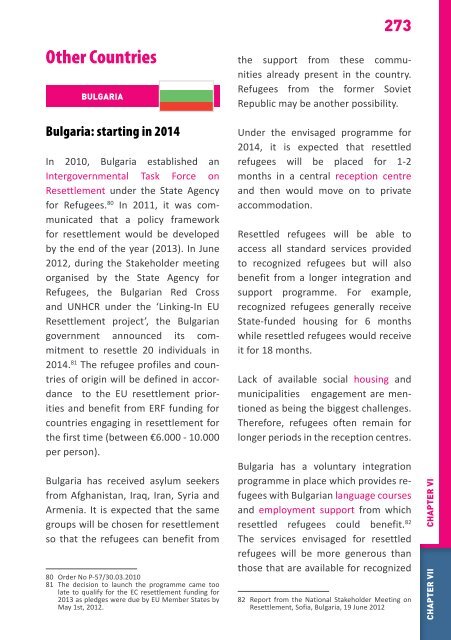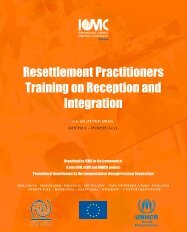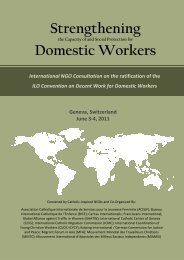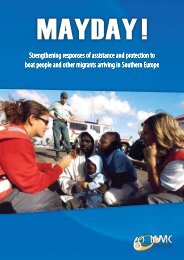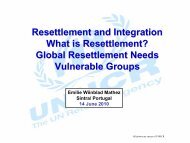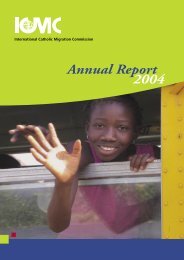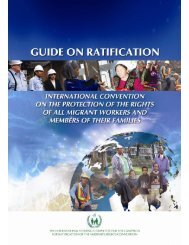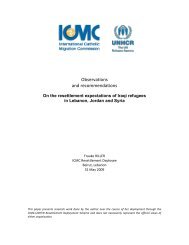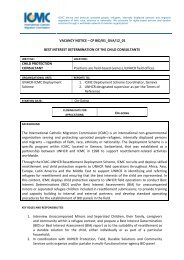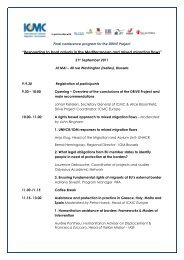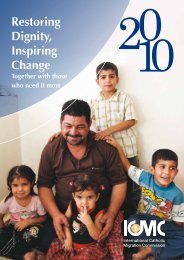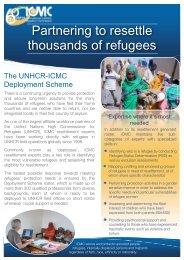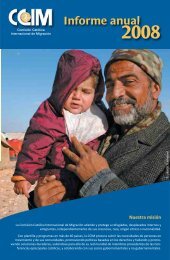ICMCEUROPE WelcometoEurope.pdf (5.89 MB)
ICMCEUROPE WelcometoEurope.pdf (5.89 MB)
ICMCEUROPE WelcometoEurope.pdf (5.89 MB)
Create successful ePaper yourself
Turn your PDF publications into a flip-book with our unique Google optimized e-Paper software.
Other Countries<br />
Bulgaria<br />
Bulgaria: starting in 2014<br />
In 2010, Bulgaria established an<br />
Intergovernmental Task Force on<br />
Resettlement under the State Agency<br />
for Refugees. 80 In 2011, it was communicated<br />
that a policy framework<br />
for resettlement would be developed<br />
by the end of the year (2013). In June<br />
2012, during the Stakeholder meeting<br />
organised by the State Agency for<br />
Refugees, the Bulgarian Red Cross<br />
and UNHCR under the ‘Linking-In EU<br />
Resettlement project’, the Bulgarian<br />
government announced its commitment<br />
to resettle 20 individuals in<br />
2014. 81 The refugee profiles and countries<br />
of origin will be defined in accordance<br />
to the EU resettlement priorities<br />
and benefit from ERF funding for<br />
countries engaging in resettlement for<br />
the first time (between €6.000 - 10.000<br />
per person).<br />
Bulgaria has received asylum seekers<br />
from Afghanistan, Iraq, Iran, Syria and<br />
Armenia. It is expected that the same<br />
groups will be chosen for resettlement<br />
so that the refugees can benefit from<br />
80 Order No P-57/30.03.2010<br />
81 The decision to launch the programme came too<br />
late to qualify for the EC resettlement funding for<br />
2013 as pledges were due by EU Member States by<br />
May 1st, 2012.<br />
273<br />
the support from these communities<br />
already present in the country.<br />
Refugees from the former Soviet<br />
Republic may be another possibility.<br />
Under the envisaged programme for<br />
2014, it is expected that resettled<br />
refugees will be placed for 1-2<br />
months in a central reception centre<br />
and then would move on to private<br />
accommodation.<br />
Resettled refugees will be able to<br />
access all standard services provided<br />
to recognized refugees but will also<br />
benefit from a longer integration and<br />
support programme. For example,<br />
recognized refugees generally receive<br />
State-funded housing for 6 months<br />
while resettled refugees would receive<br />
it for 18 months.<br />
Lack of available social housing and<br />
municipalities engagement are mentioned<br />
as being the biggest challenges.<br />
Therefore, refugees often remain for<br />
longer periods in the reception centres.<br />
Bulgaria has a voluntary integration<br />
programme in place which provides refugees<br />
with Bulgarian language courses<br />
and employment support from which<br />
resettled refugees could benefit. 82<br />
The services envisaged for resettled<br />
refugees will be more generous than<br />
those that are available for recognized<br />
82 Report from the National Stakeholder Meeting on<br />
Resettlement, Sofia, Bulgaria, 19 June 2012<br />
CHAPTER VI<br />
CHAPTER VII


